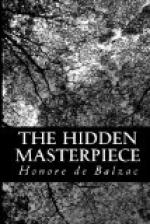“Yes, my friend,” answered the old man, rousing from his abstraction, “we need faith; faith in art. We must live with our work for years before we can produce a creation like that. Some of these shadows have cost me endless toil. See, there on her cheek, below the eyes, a faint half-shadow; if you observed it in Nature you might think it could hardly be rendered. Well, believe me, I took unheard-of pains to reproduce that effect. My dear Porbus, look attentively at my work, and you will comprehend what I have told you about the manner of treating form and outline. Look at the light on the bosom, and see how by a series of touches and higher lights firmly laid on I have managed to grasp light itself, and combine it with the dazzling whiteness of the clearer tones; and then see how, by an opposite method,—smoothing off the sharp contrasts and the texture of the color,—I have been able, by caressing the outline of my figure and veiling it with cloudy half-tints, to do away with the very idea of drawing and all other artificial means, and give to the form the aspect and roundness of Nature itself. Come nearer, and you will see the work more distinctly; if too far off it disappears. See! there, at that point, it is, I think, most remarkable.” And with the end of his brush he pointed to a spot of clear light color.
Porbus struck the old man on the shoulder, turning to Poussin as he did so, and said, “Do you know that he is one of our greatest painters?”
“He is a poet even more than he is a painter,” answered Poussin gravely.
“There,” returned Porbus, touching the canvas, “is the ultimate end of our art on earth.”
“And from thence,” added Poussin, “it rises, to enter heaven.”
“How much happiness is there!—upon that canvas,” said Porbus.
The absorbed old man gave no heed to their words; he was smiling at his visionary woman.
“But sooner or later, he will perceive that there is nothing there,” cried Poussin.
“Nothing there!—upon my canvas?” said Frenhofer, looking first at the two painters, and then at his imaginary picture.
“What have you done?” cried Porbus, addressing Poussin.
The old man seized the arm of the young man violently, and said to him, “You see nothing?—clown, infidel, scoundrel, dolt! Why did you come here? My good Porbus,” he added, turning to his friend, “is it possible that you, too, are jesting with me? Answer; I am your friend. Tell me, can it be that I have spoiled my picture?”
Porbus hesitated, and feared to speak; but the anxiety painted on the white face of the old man was so cruel that he was constrained to point to the canvas and utter the word, “See!”
Frenhofer looked at his picture for a space of a moment, and staggered.
“Nothing! nothing! after toiling ten years!”
He sat down and wept.
“Am I then a fool, an idiot? Have I neither talent nor capacity? Am I no better than a rich man who walks, and can only walk? Have I indeed produced nothing?”




